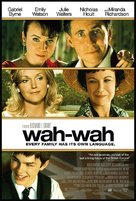Reviews provided by RottenTomatoes
Connie Ogle, Miami Herald: In the end, the film isn't saying much at all. Read more
Moira MacDonald, Seattle Times: The actors give it a spark, and Grant directs his fine cast with sureness. Read more
Jessica Reaves, Chicago Tribune: Watching it is like trying to assemble a puzzle that's missing pieces: You can see the outline of a story, and some shapes fit neatly together, but there are undeniable holes. Read more
Bilge Ebiri, New York Magazine/Vulture: As a story, Wah-Wah is far from perfect, but its wonderful cast brings it a complexity all too rare today. Read more
Richard Roeper, Ebert & Roeper: ... this is a melodramatic, slow-moving soap opera filled with shrill caricatures. Read more
Eleanor Ringel Gillespie, Atlanta Journal-Constitution: What the movie lacks in depth -- it's really little more than a glimpse of this boy and these people in this place at this time -- it makes up for in its well-observed details and sneaky humor. Read more
Wesley Morris, Boston Globe: The movie, in recounting all this personal and national upheaval, seems curiously, almost inappropriately nostalgic rather than subversive, revisionist, or informed. Read more
Kevin Crust, Los Angeles Times: Grant opens up his life, not with embarrassment or explanation but with humanity and gratitude. Emotional, melodramatic and sentimental, the film unabashedly wears its heart on its sleeve, and is the better for it. Read more
Peter Rainer, Christian Science Monitor: [Grant's] ambitions to make a movie about the loss of innocence and the passing of empire are unrealized, but there are some fine grace notes and a few resounding minor chords to be heard along the way. Read more
Lisa Schwarzbaum, Entertainment Weekly: An overdeveloped coming-of-age potboiler set on the eve of Swaziland's independence. Read more
Philip Wuntch, Dallas Morning News: A lovably eccentric actor, Mr. Grant has created a lovably eccentric dramady. Read more
Ella Taylor, L.A. Weekly: As you'd expect, Grant works expertly with a terrific ensemble. Read more
Jan Stuart, Newsday: Switching hats from actor to writer/director, Grant smoothly serves up everything you expect in a coming-of-age tale. Read more
Lisa Rose, Newark Star-Ledger: The film plays like a scattered collection of memories rather than a straight story. The emotional and political aspects of the movie never converge to make a point. Read more
Jami Bernard, New York Daily News: Grant captures the essence both of boyhood rites of passage and a particular time and place for which he clearly holds affection, bumps, ruts and all. Read more
James Berardinelli, ReelViews: As coming of age stories go, Wah-Wah does little to distinguish itself. Read more
Roger Ebert, Chicago Sun-Times: I admired the movie and was happy to see it but can think of two other films about whites in Africa that do a better job of seeing their roles. Read more
Ruthe Stein, San Francisco Chronicle: The characters may be based on real people, but they fail to spring to life onscreen. As a result, their histrionics often are laughable, like the over-the-top shenanigans in a Douglas Sirk melodrama. Read more
Rick Groen, Globe and Mail: What is understandably a subject of great fascination to [Grant] soon becomes a crashing bore to us. Read more
Peter Howell, Toronto Star: Deftly balancing the end of British colonialism in Africa against a family's painful disintegration, Wah-Wah marks the impressive directing debut of Richard E. Grant. Read more
Dave Calhoun, Time Out: Gabriel Byrne gives a great performance as Ralph's troubled father, Harry, and Miranda Richardson and Emily Watson are enjoyable as Harry's wife and American lover. Read more
Derek Elley, Variety: Above all, the film has a wonderful sense of ensemble in the portrayal of its inbred community, and the focus stays tight on the people rather than political events. Read more
Rob Nelson, Village Voice: That the film is semi- autobiographical for caustic actor-turned-writer-director Richard E. Grant helps explain its severely, sometimes laughably bitter tone. Read more
Desson Thomson, Washington Post: Grant's unblinking but sympathetic depiction of this emotionally unhinged world makes the viewer feel like an illicit, enlightened gawker, and it has the enormous fringe benefit of fine performers. Read more

